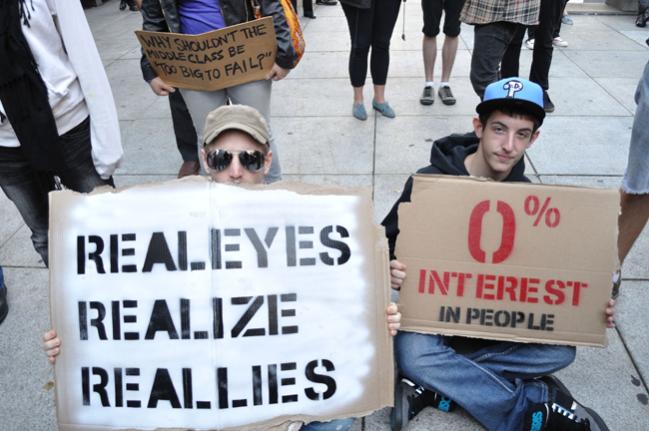
A month ago, I wrote a column in PW comparing the Tea Party and the Occupy movement. Specifically, why the American Right decided to immediately embrace one and not the other. It was a fairly tongue-in-cheek question. One look at who the Occupiers are, and who their enemy is, supplies the answer. But the point—Tea Partiers and Occupiers won’t admit it, but they’ve got more in common than they think—still holds true. Often in sinister ways.
As the Occupy movement has proceeded, the liberal and conservative causes have overlapped on several fronts, including their shared abilities to take over the Internet with their messages, “occupy” the headlines and infuriate the other side. They both think they’re essentially the civil rights movements of the 21st century, too. Some Occupiers, like Anna Kauffman, 66, of Northeast Philly, have even begun calling on the government to lower taxes, saying the burden on small businesses is too much—which is essentially the entire point of the Tea Party movement.
“I see similarities with the Tea Party,” says an Occupy Philly protester named Matthew at the ‘Occupy Mitt Romney’ protest last week. He pauses. “But then again, I don’t know much about what the Tea Party stands for.”
Others at the same protest said the main difference is that Occupy hasn’t been taken over by corporate interests.
One consists of predominantly young people, the other old. One’s got a clear, on-point message (lower taxes; stop subsidizing American “losers” who can’t pay their mortgages) and strategy (elect Republicans). The other’s got a series of messages, one of which I recently overheard was the complete annihilation of the current two-party system of government. (Also: eliminating corporate influence over themselves; getting lobbyists out of government; raising the minimum wage; getting our military out of the Middle East.)
“[The Occupy] movements are spreading all over the place,” author Corey Robin told PW when the protests began. “They’ve spread a lot of imagination and momentum but they haven’t actually proposed actually doing something that would really threaten Wall Street. But I think until they have a clear political agenda, that will start resulting in a fundamental transfer of power.”
A month later, clear political agendas are forming. And that’s where Occupy Philly and the Tea Party seem to agree: The slow climb of the bruised American economy must be stopped dead in its tracks until the “war” on the respective movements—and, by extension, the American people—are done. And when will that be? For Tea Partiers, it’s when Republicans are in the White House. For Occupiers, it’s when the entire system changes for good.
Last Sunday, Occupy Philly unanimously passed a resolution calling for “a Constitutional Amendment to purify the political process”—essentially ending what’s called “corporate personhood” in the United States. Corporate Personhood is the Supreme Court-sanctioned idea that corporations get the same free-speech rights as regular Americans in the political arena, as persons are defined according to the 14th Amendment. It was recently legalized in a 5-4 decision by the U.S. Supreme Court. And it is set to unleash a corporate-funded 2012 political campaign unlike any we’ve ever seen. Several independent groups, like Wolf PAC, and even President Obama, have decried the decision. Wolf PAC has called for a Constitutional Convention that would result in the outlawing of corporate influences over politics.
But what’s Occupy Philly’s plan to help stop this? Simple. Encourage the destruction of the economy through “national strikes,” “national work stoppages,” and “Refraining from buying anything other than Essential of life purchases.” That’s at least what was passed last Sunday.
The Tea Party, on the other hand, supports Corporate Personhood, as well as any form of money tossing that could be construed as “free market capitalism,” because that’s what their ideal of America is based on. Presidential candidate Mitt Romney recently said at a campaign event that “corporations are people too,” when asked about the law.
Melissa Brookstone of the Tea Party Nation recently posted a similar declaration on that group’s website. She called for small-business owners, whom she believes are “the class that produces the vast majority of real, wealth producing jobs in this country,” to “not hire a single person until this war against business and my country is stopped.”
Her reasons come from the usual Tea Party place: “The Obama administration and the Democrat-controlled Senate, in alliance with a global Progressive socialist movement, have participated in what appears to be a globalist socialist agenda of redistribution of wealth, and the waging of class warfare against our constitutional republic’s heritage of individual rights, free market capitalism.”
Whether you’re a small-business owner or a consumer, intentionally hurting the economy by not contributing to it ultimately produces the same result, even if for entirely different reasons. And the economy is already circling the toilet pretty well on its own, thank you very much. Unemployment is stuck at 9 percent and jobs are growing at a slower rate (about -5 percent since 2007) than almost every other industrialized country (Canada, the U.K., Japan, Italy, Germany) that suffered from the initial 2008 recession brought on by decades of greed and deregulation, even though our GDP has basically bounced back to pre-recession levels. Which is probably a testament to the American work ethic. But it also means it’s going to take more work to get our economy off the ground.
Any further attempts to further demolish the economy—on top of the congressional GOP’s ongoing efforts to focus on cuts rather than jobs—could have disastrous effects. Which brings us back to the reasons the respective groups have this goal in mind. For the Tea Party, it’s to elect Republicans. For Occupy, it’s to change everything. And while the means may be the same, that’s probably the most important difference between the groups.




